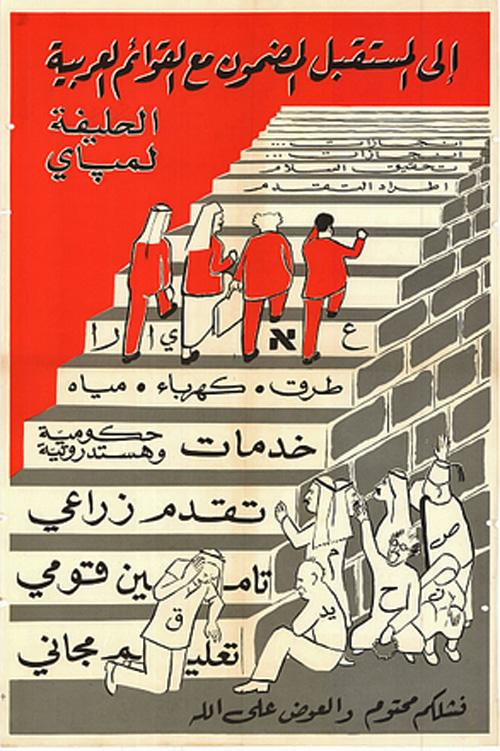Arabic translation: (text at top)
Towards a secure future with the Arab lists - the alliance with Mapai
________________________
Curator's note: This poster depicts four men, one of them David Ben Gurion (the figure carrying the briefcase) ascending a set of stairs. Each step has Arabic terms written on it.
(Reading downward from the top - text on very top two steps)
Accomplishments...
Accomplishments...
(third and fourth step with text)
Achieving peace
Uninterrupted/steady progress
(Reading now from the bottom step up)
Free education
National insurance
Agricultural progress
Work (government and Histadrut)
Roads - electricity - water
The step the four men are about to reach carries the Arabic and Hebrew letters representing the parties in the Mapai Alliance
The man on the far right: the party designation is the Arabic letter "ein"; the next man to the left is Ben Gurion - his Mapai Party designation is the Hebrew letter "alef" (in bold); the third man from the right represents the Cooperation and Brotherhood Party and he stands near the Arabic letters "ya" and "alef"; the fourth man from the right stands near the party designation for the Agriculture and Development Party which had the assigned Arabic election letters of "lem" and "alef"
At the bottom of the steps stand several weeping and regretful figures (one with two heads) each bearing a letter/letters denoting an Arab political party that failed to join Mapai in a political alliance
The black text at the very bottom applies to these figures only: Your failure is assured and no aid will be forthcoming
The political parties represented by the figures at the bottom are:
Man at the bottommost step: an Arabic "qaf" (ق) is written on his shirt. This is the designation for the Israeli Communist Party
Second man from left, sitting: the Arabic letters "ya" and "dal" (يد) (hand)
Third man from left, with two heads: an Arabic "mim" (م) is written on his shirt
Fourth man from the left, the figure squatting down with what appears to be a ring of keys in his left hand: an Arabic "ha" is written on his shirt;
Fifth figure has no letter designation;
Sixth figure, of a woman sitting down: the Arabic letter "nun" is written on her robe designating the Progress and Work Party;
Last figure, of a man with a fez; an Arabic "sodd" is written on the back of his coat
____________________________________
"That did not mean, however, that the Israeli establishment was going to leave the choice of how to vote to the Arabs themselves. As Cohen shows, the Israeli military government—under which nearly all the country’s Arab citizens lived from 1948 until 1966—used its powers to issue or deny travel and work permits and to provide budgets for local projects to wheedle, induce, and compel Arabs to vote as the country’s establishment wished. The government, led by the Labor-Zionist Mapai party, wanted the Arabs to vote for satellite Arab parties it had founded and which were under its control. (It did not want them to vote for Mapai itself because it wanted to ensure the election of Arab community leaders who supported its policies.) And it wanted to prevent them from voting for the Communists, the major independent political force in the Arab community."
Source: South Jerusalem review of Hillel Cohen's book "Good Arabs"
http://southjerusalem.com/2009/10/votes-are-not-enough-hillel-cohens-goo...

